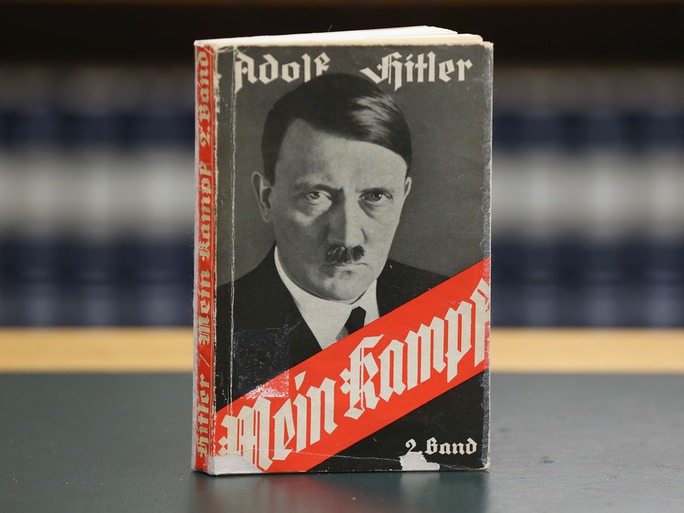The copyright on Hitler's Mein Kampf expired on December 31, 2015, and the Institute for Contemporary History in Munich will be releasing a heavily annotated version next week for the German market. The Institute wants its footnotes to expose the "lies, half-truths and vicious tirades," the institute said, behind a Nazi vision of racist hostility that ended in the deaths of tens of millions of people in World War II. Censoring Mein Kampf in Germany was a lost cause anyway – at least since the advent of the Internet – because the text could easily be downloaded for free from numerous international sites. The American neo-Nazi group Stormfront makes the book available on its Web site. Stormfront is backing the candidacy of Donald Trump for US president, so if Trump becomes the Republican nominee the book could very well become a bestseller here.
Georg Diez, the Spiegel columnist and critic, has an excellent piece this week on Mein Kampf, and I endorse his views 100%:
Denn Bücher sind nicht böse. Menschen sind böse. Bücher sind nicht gefährlich. Menschen sind gefährlich. Bücher töten keine Menschen. Menschen töten Menschen. Bücher sollten nie verboten werden, denn diese Art von Verboten sind Zeichen von Angst und Schwäche. Demokratien verbieten keine Bücher und keine Gedanken. Diktaturen tun das. Vielleicht ist das Verbot erklärbar aus der Panik, die die Deutschen ergriff, als sie 1945 nach dem Sieg der Alliierten in den Spiegel blickten und ein Volk von Mördern sahen. Man konnte nicht alle bestrafen. Also bestrafte man dieses Buch. Aber die, die "Mein Kampf" gelesen hatten, trugen die braunen Gedanken im Kopf herum, und manche blieben Nazis, auch ohne Reich. Sie schwiegen oder brummelten, sie schlugen ihre Kinder oder sammelten Waffen, sie verwünschten die Demokratie und starben verbittert.Das Verbot des Buches setzte die Fixierung auf Hitler fort und auch die Dämonisierung. Es ging dabei natürlich auch um Schuld. Es war aber nicht Hitler allein. Es waren Millionen von Deutschen, die zu Tätern wurden.
("For books are not evil. People are evil. Books are not dangerous. People are dangerous. Books don't kill people. People kill people. Books should never be forbidden, since banning them is a manifestation of fear and weakness. Democracies do not ban books or ban thoughts. Dictatorships do this. It is perhaps possible to explain the panic that Germans felt when they looked in the mirror after the Allied victory and saw a nation of murderers. You couldn't punish everybody; so they punished a book. But those people who read Mein Kampf carried the brown ideas around in their heads, and many remained Nazis, even absent the Reich. They stayed quiet, or they grumbled, they beat their children or they kept collecting guns, they cursed the democracy and died embittered. Banning the book only perpetuated the fixation on Hitler and his demonizaion. Of course, it also had a lot to do with guilt. But it wasn't just the fault of Hitler. There were millions of Germans who became perpetrators.")
See my review of Massenmord und schlechtes Gewissen (Mass Murder and Bad Conscience) by Frank Bajohr and Dieter Pohl.


